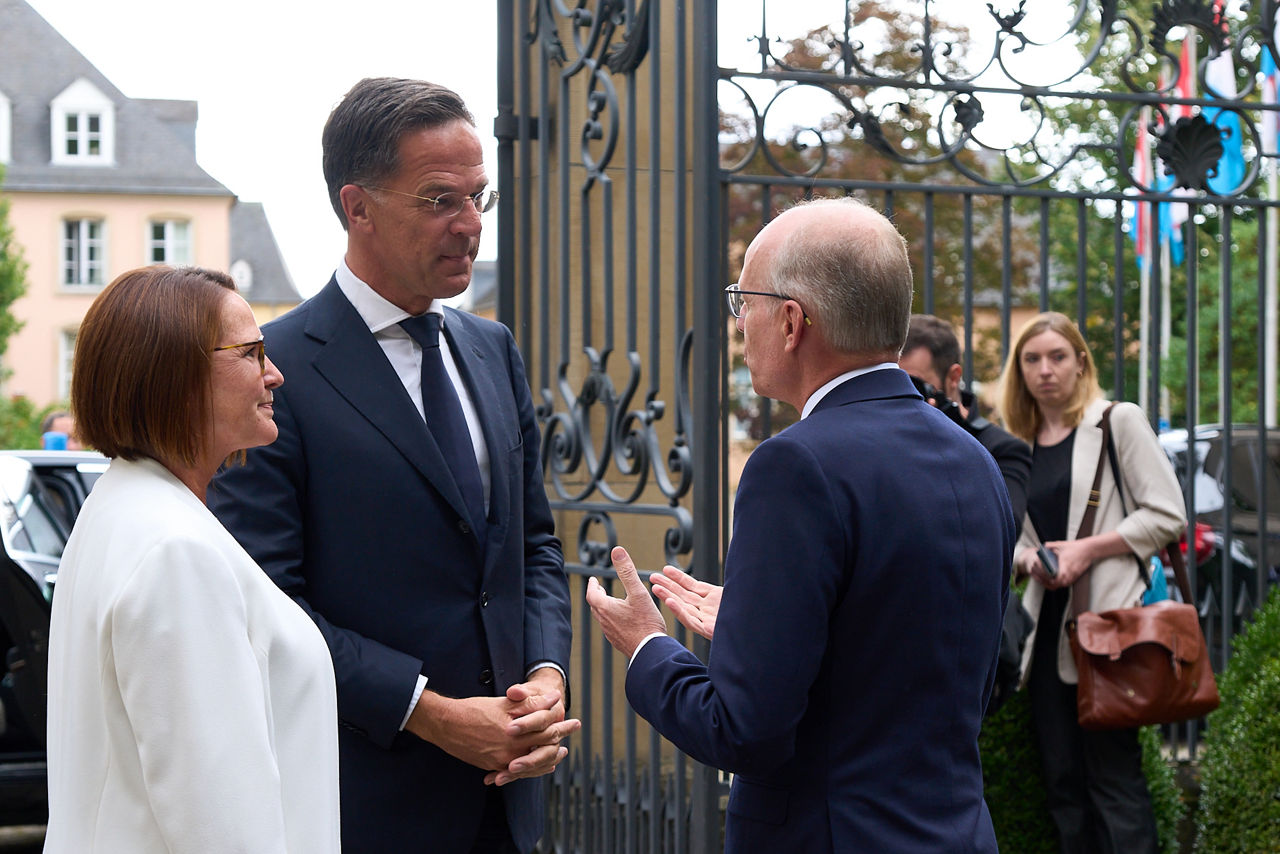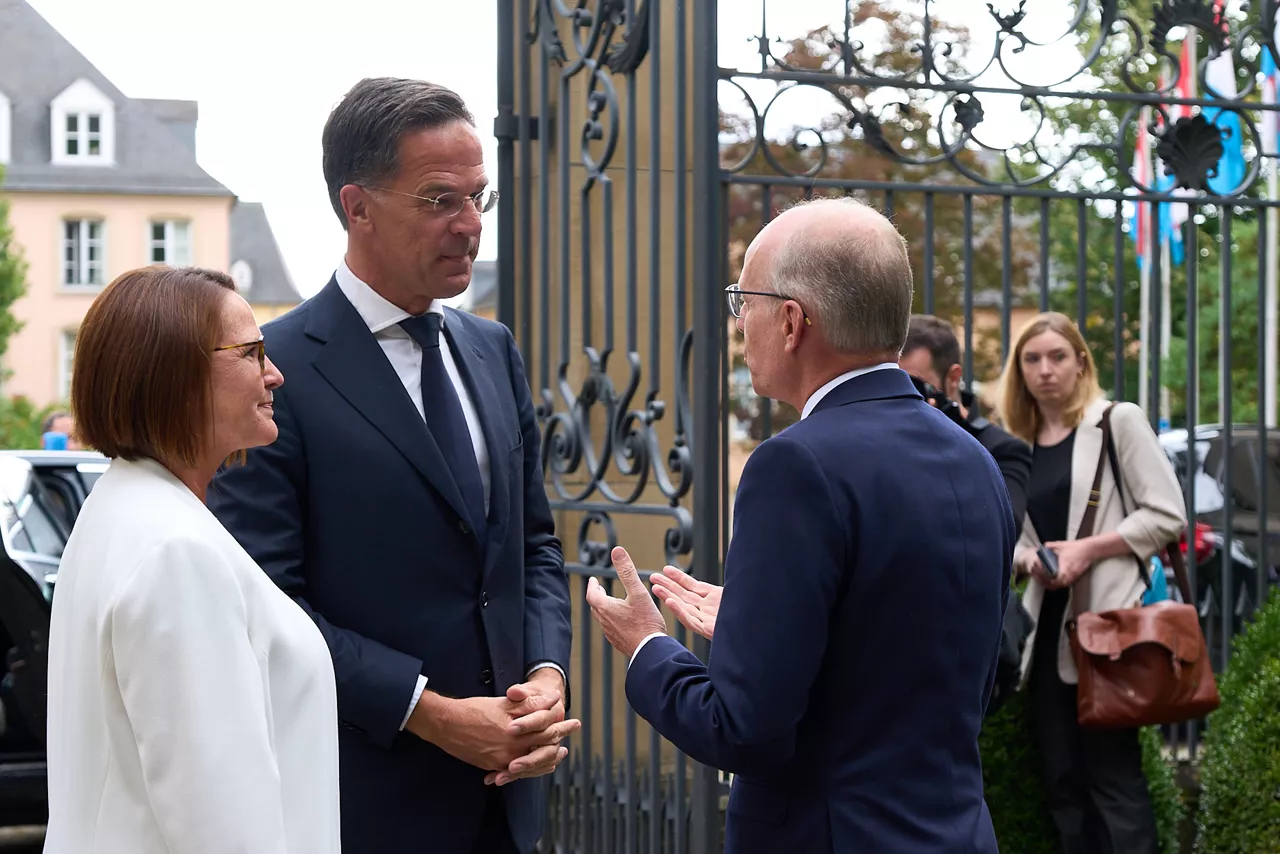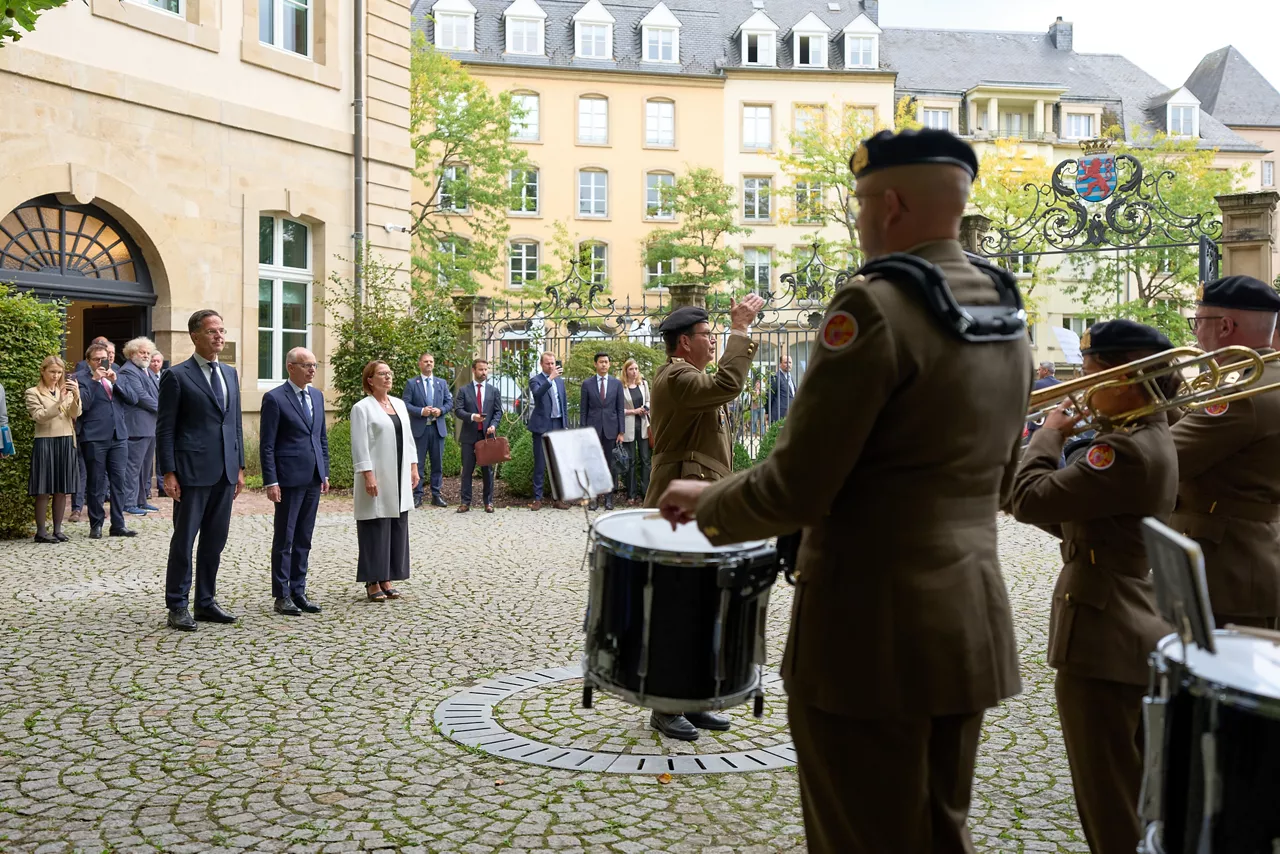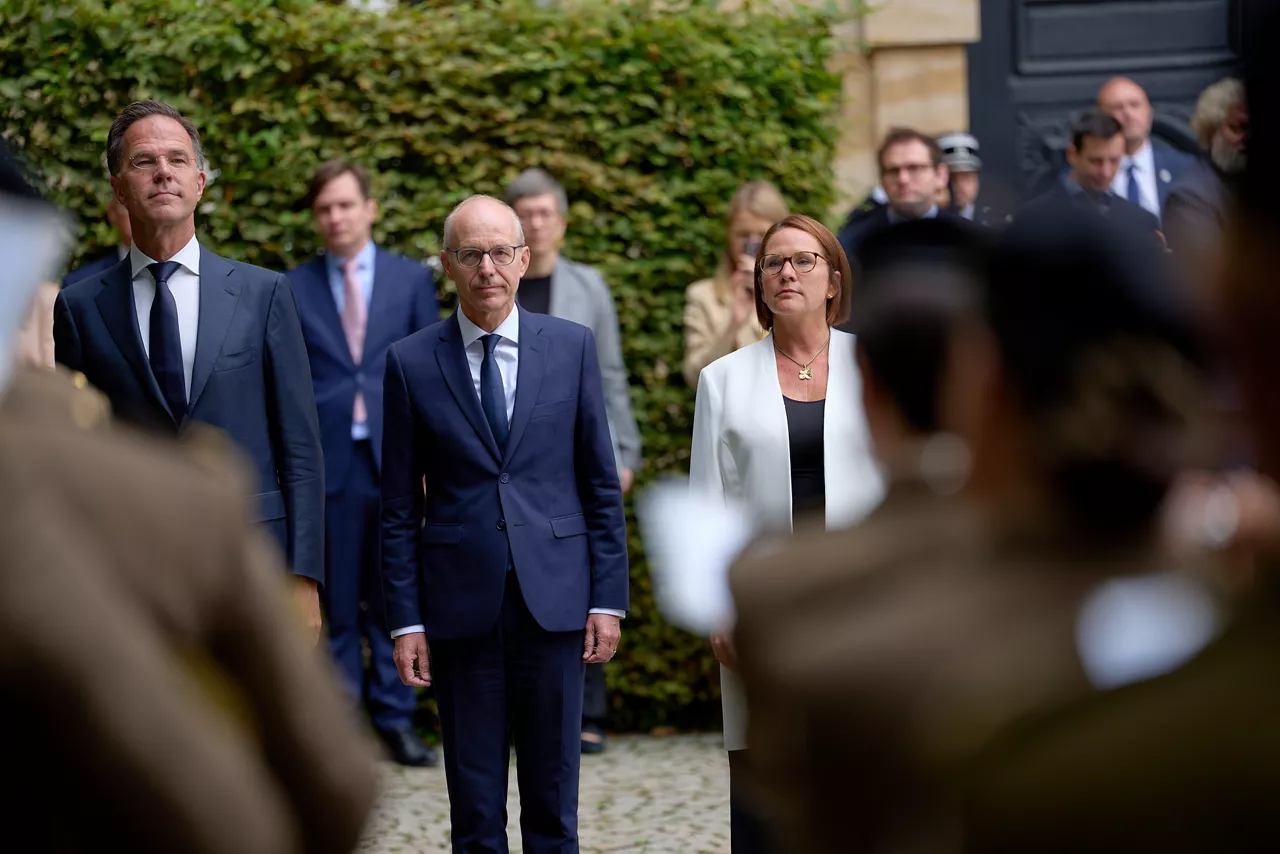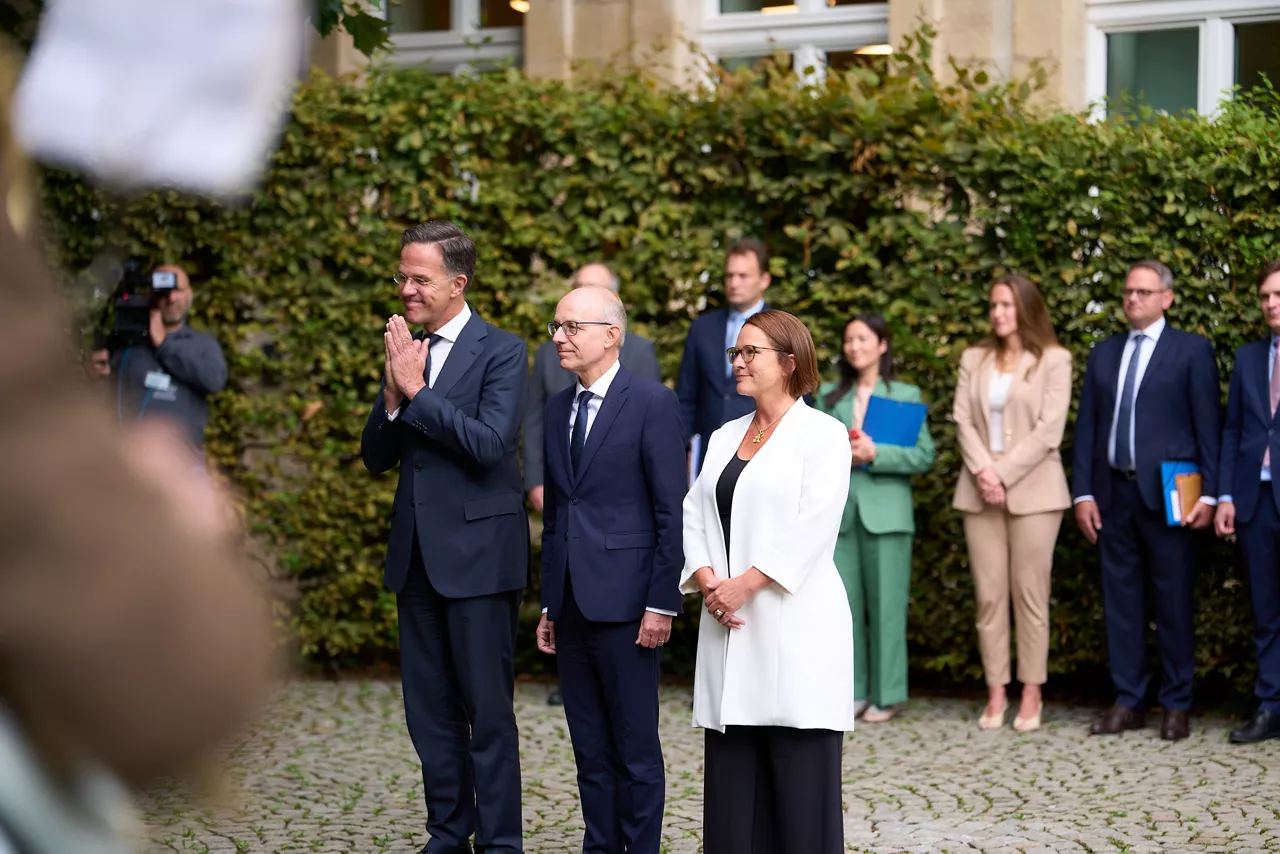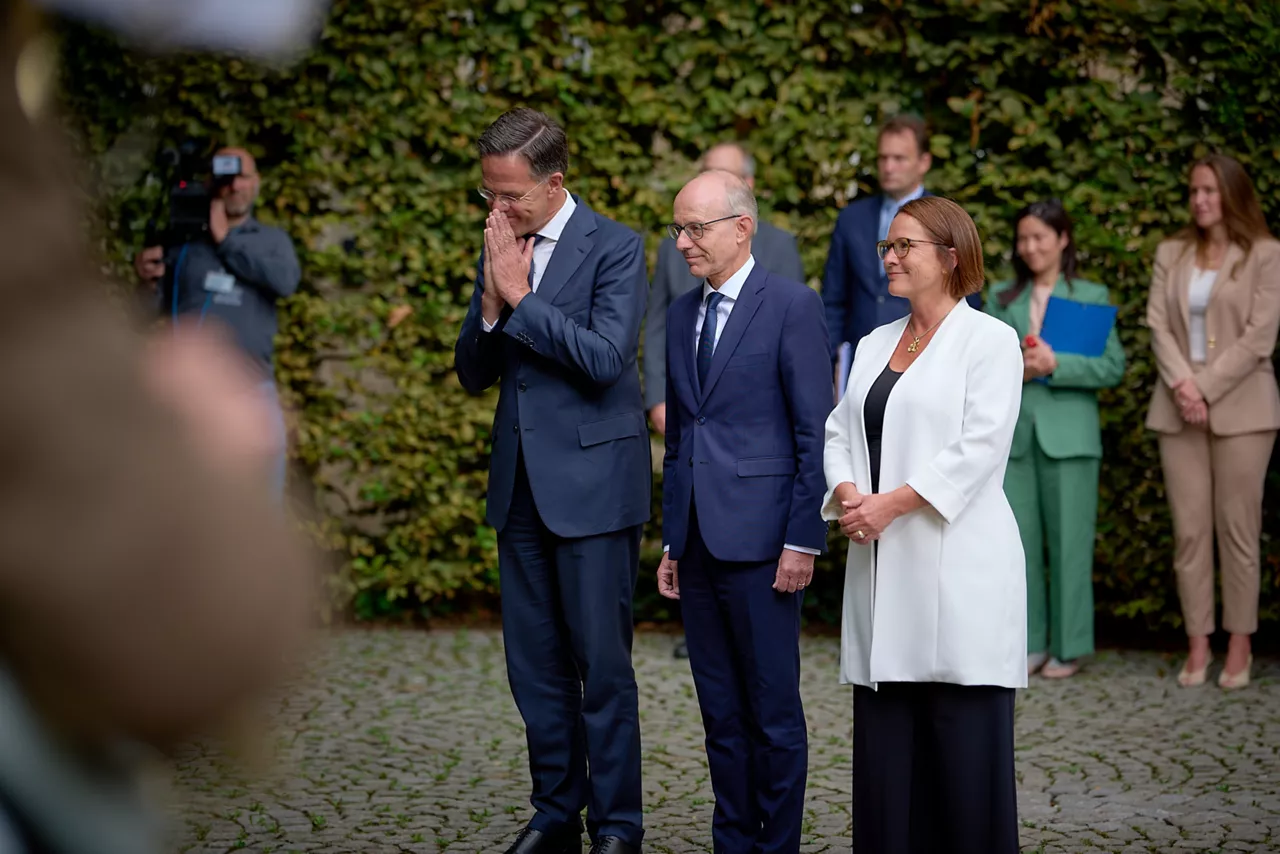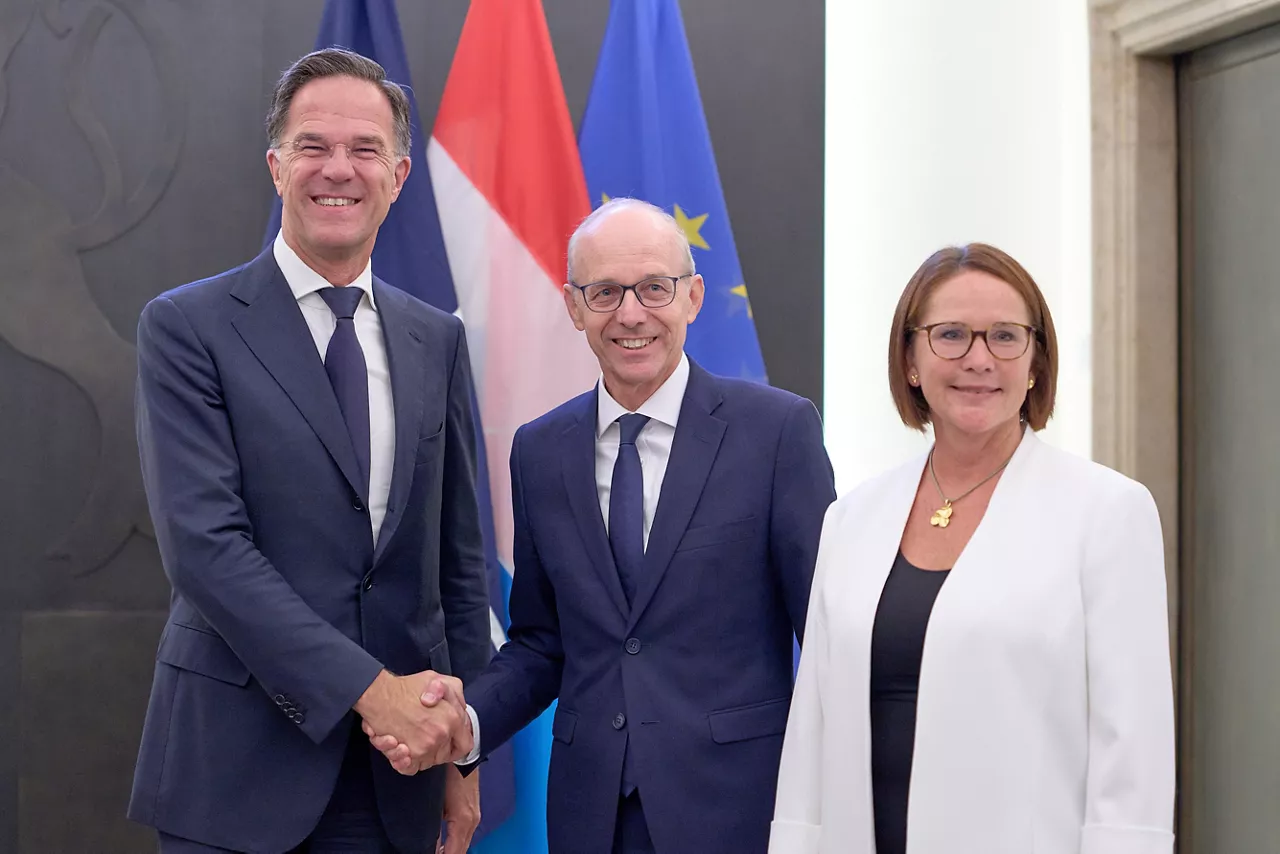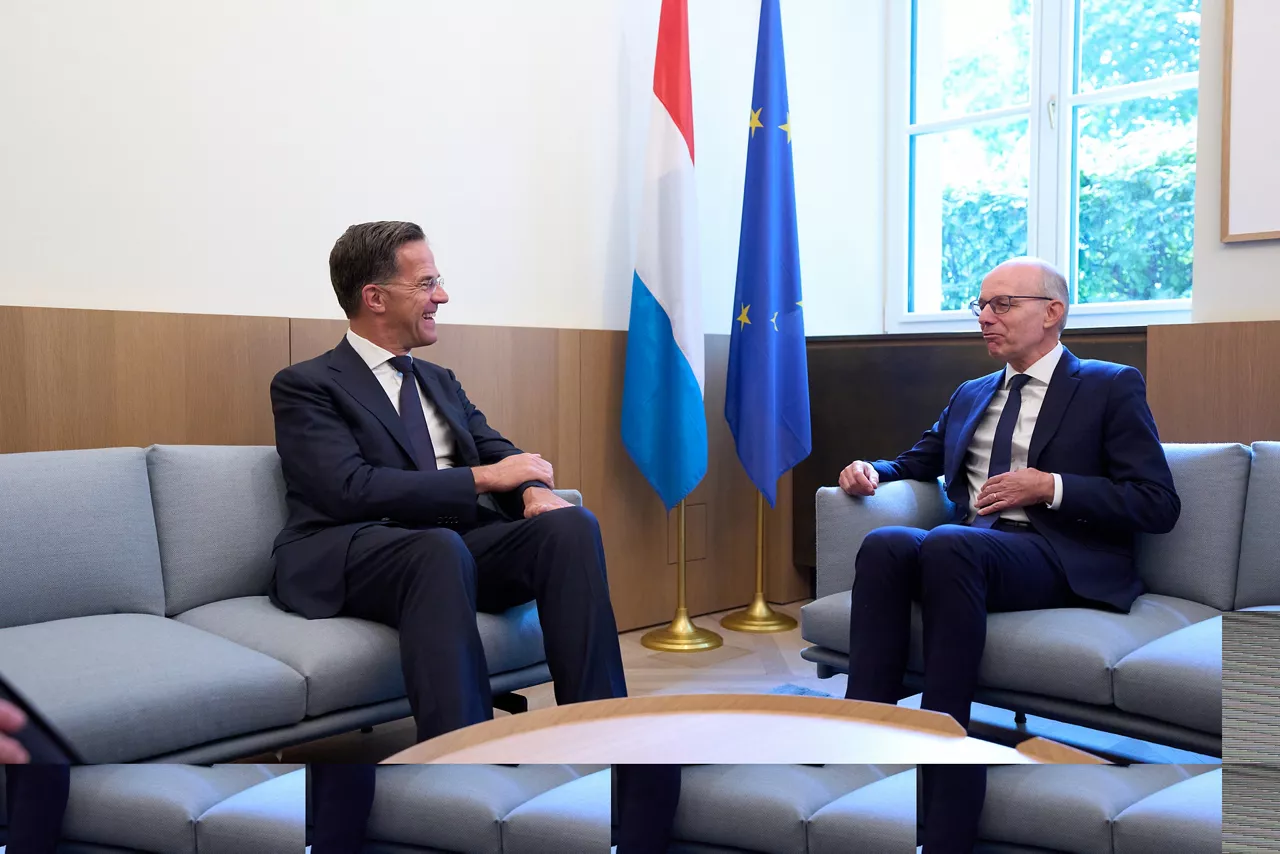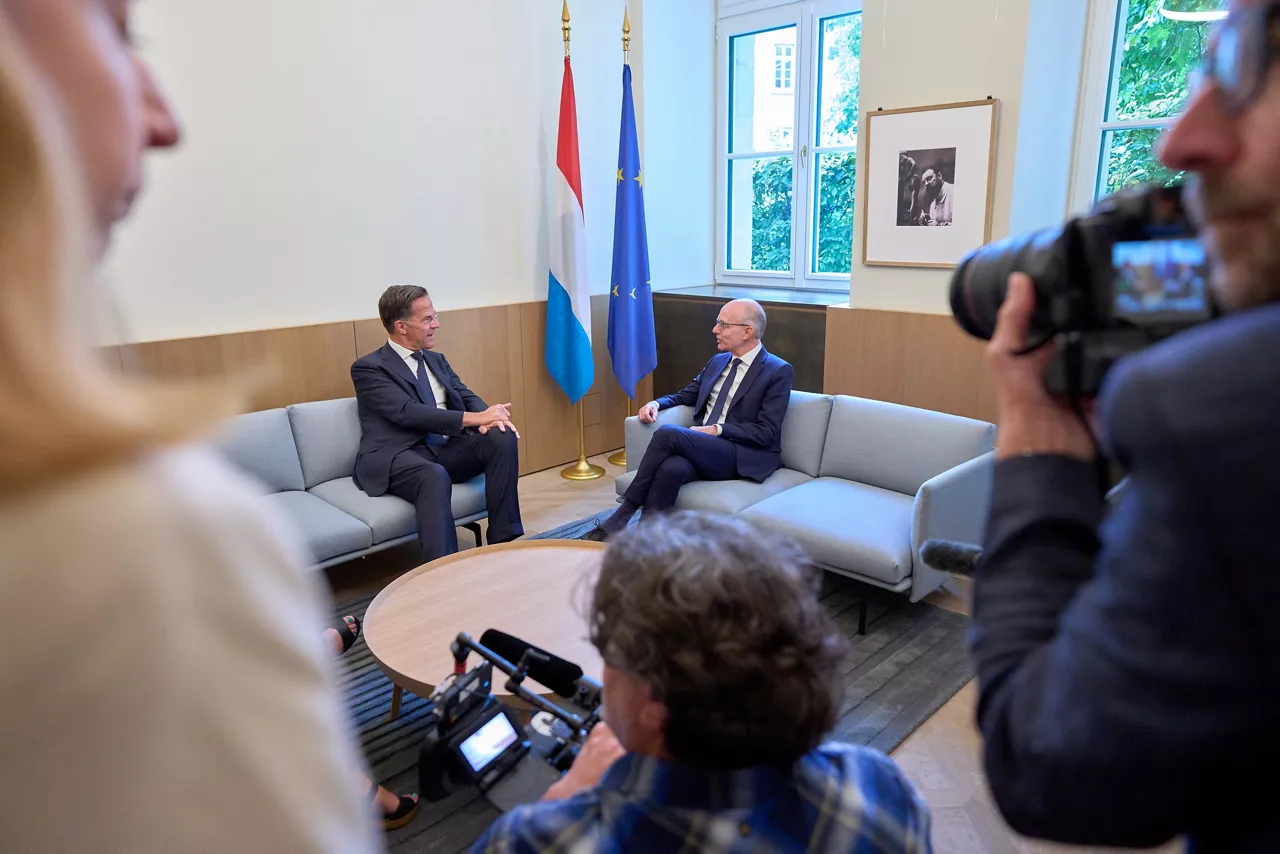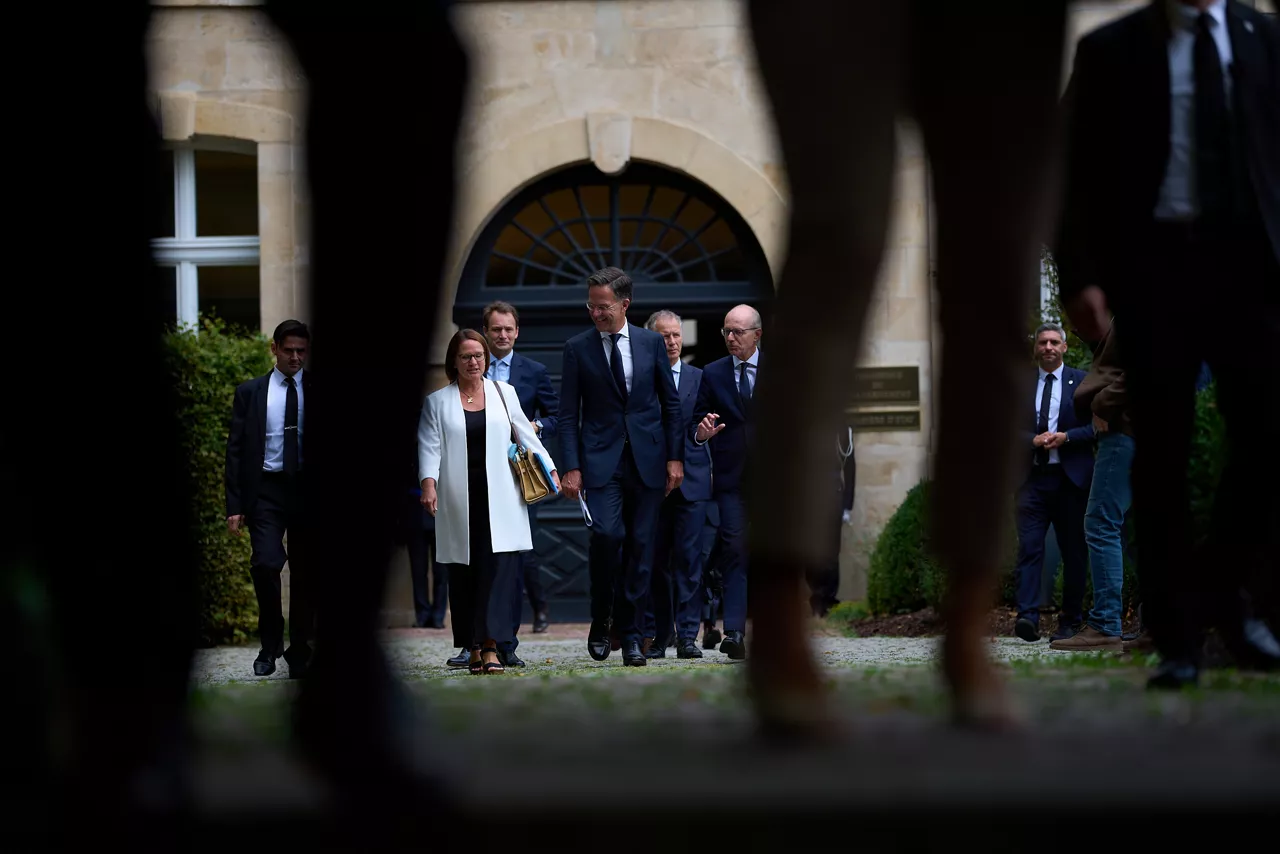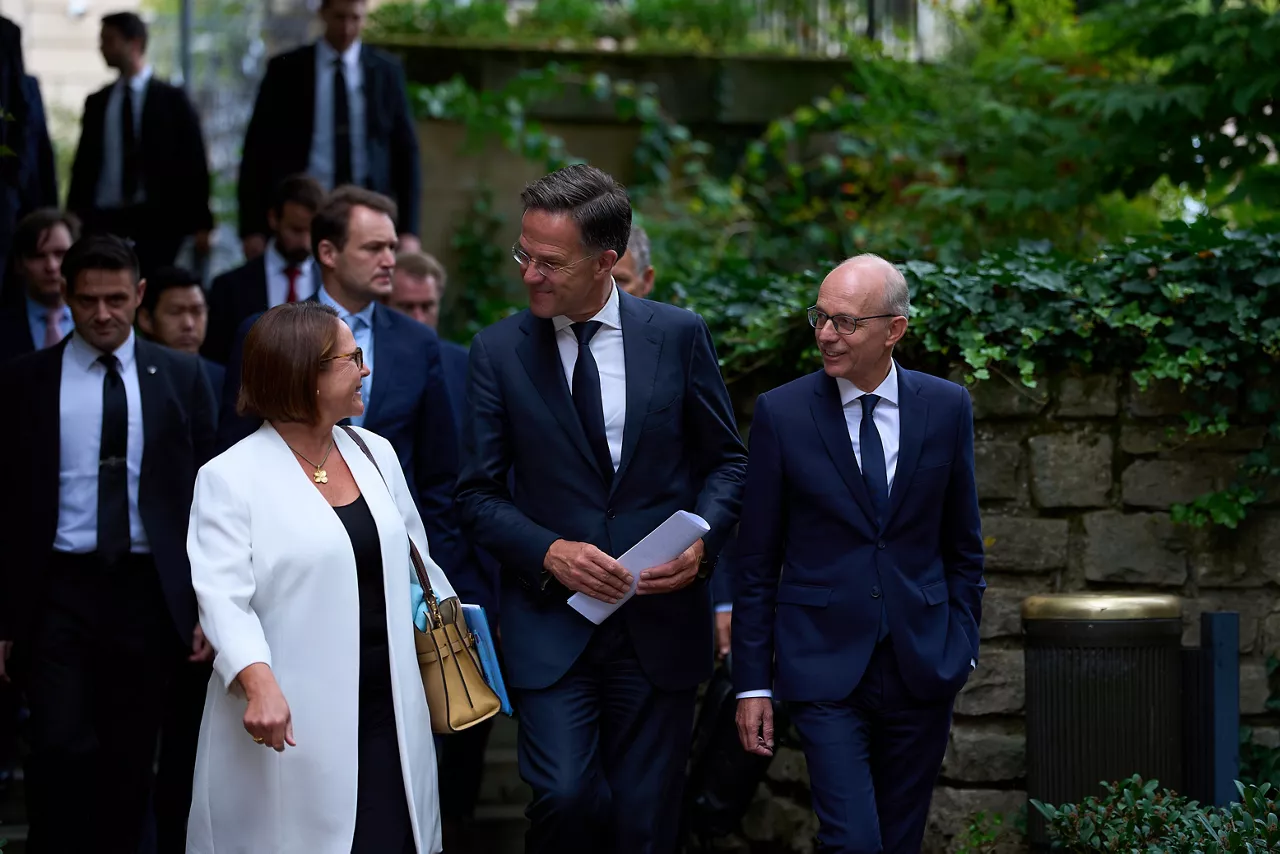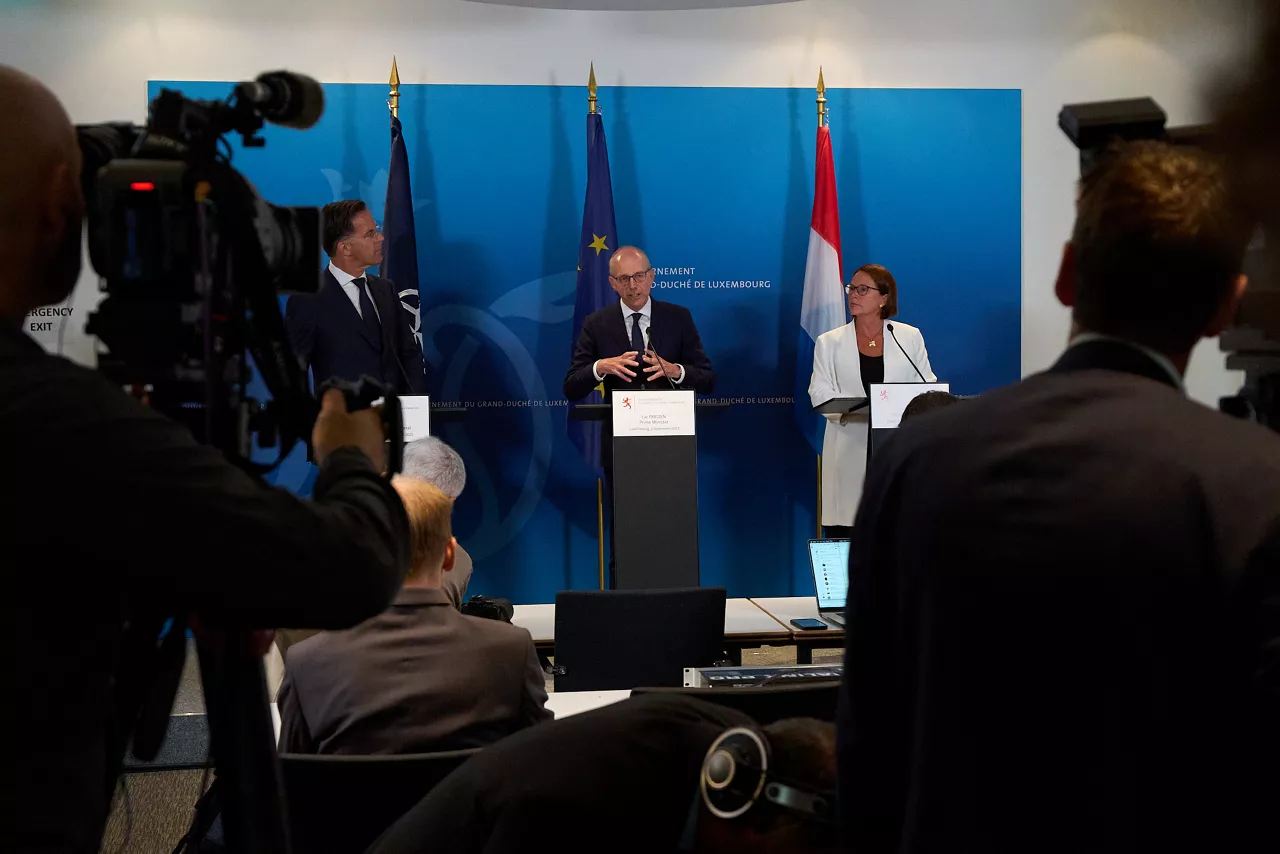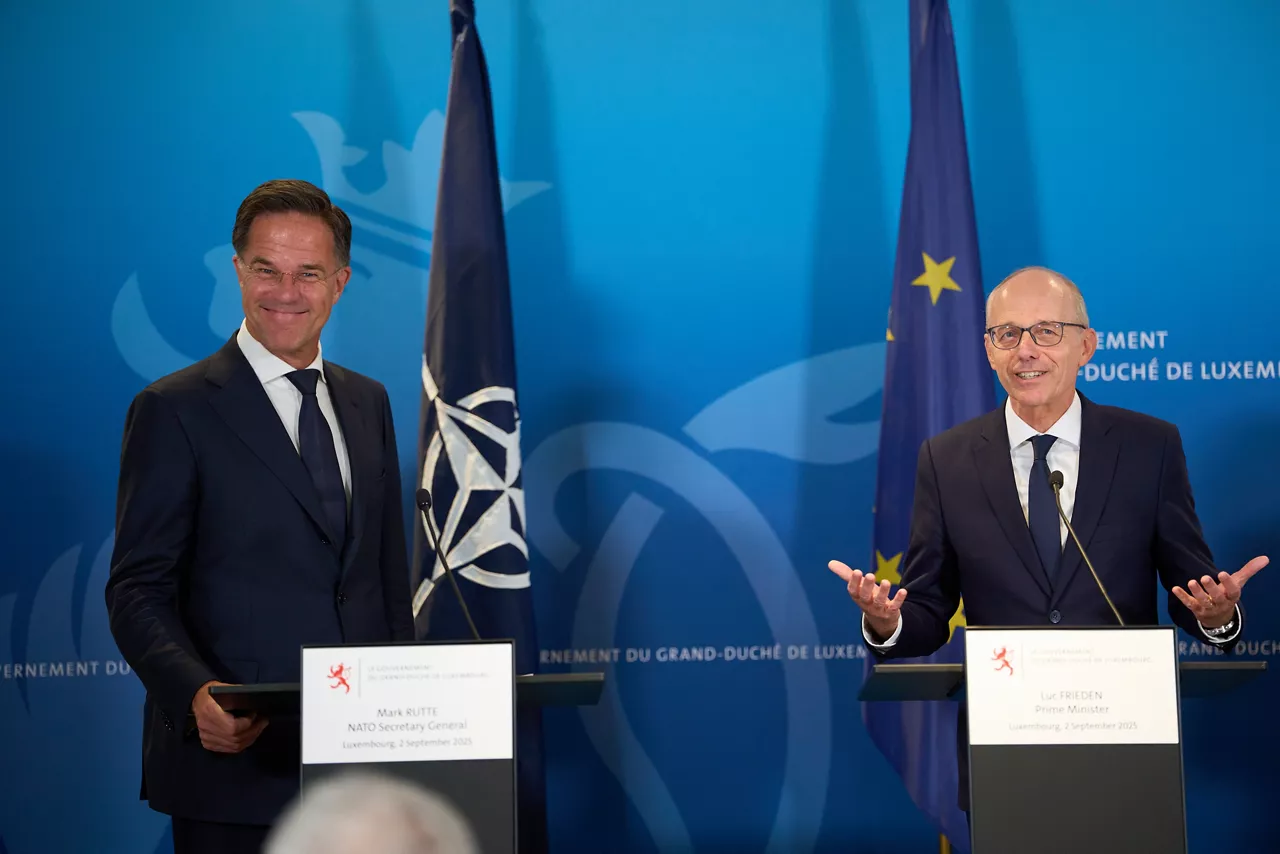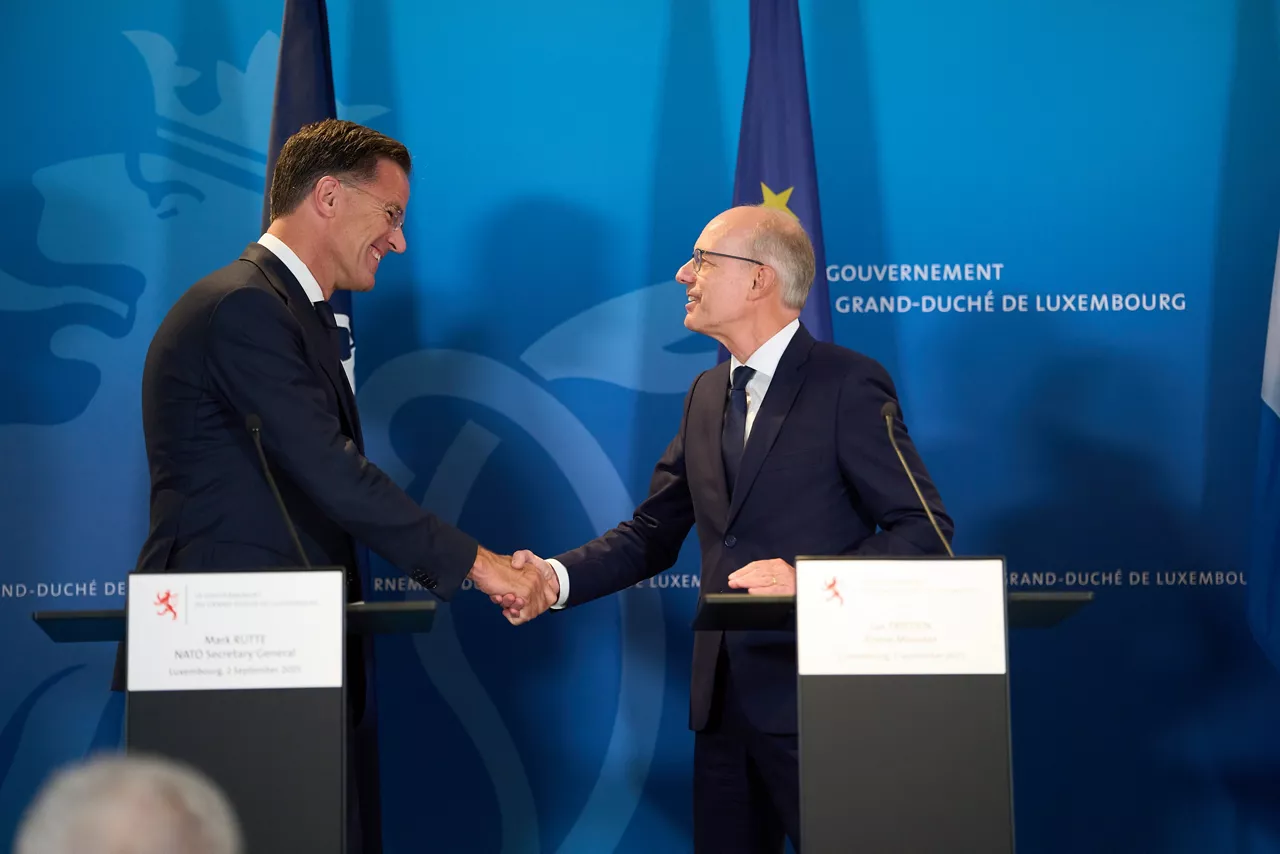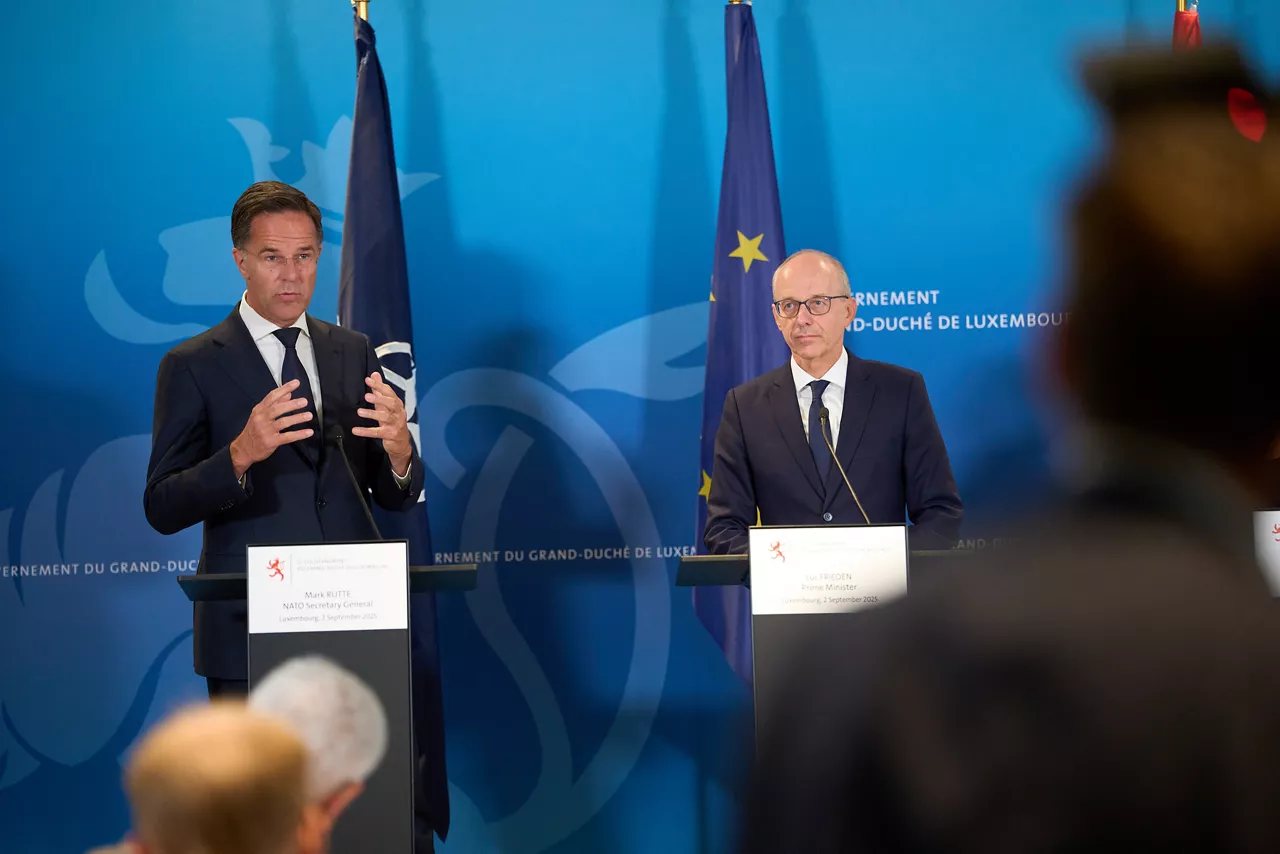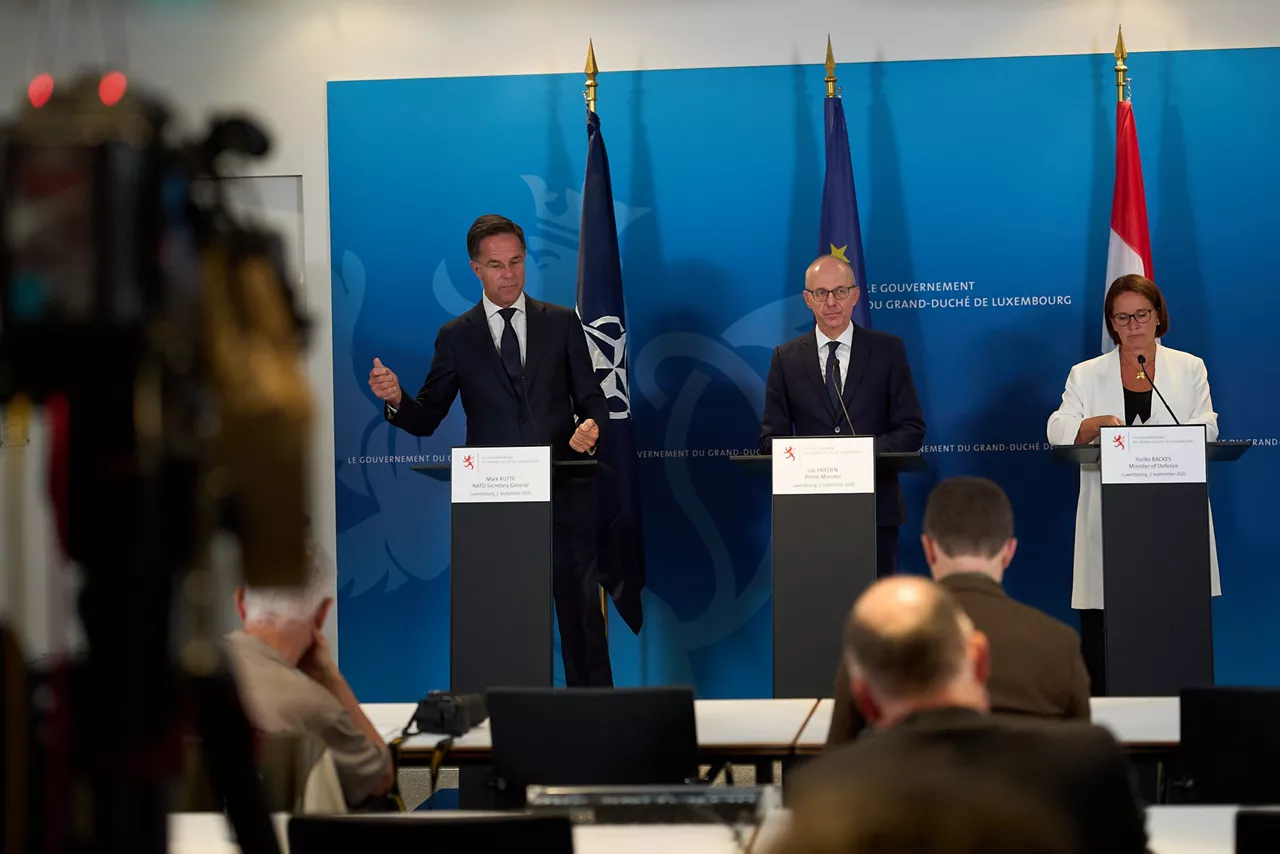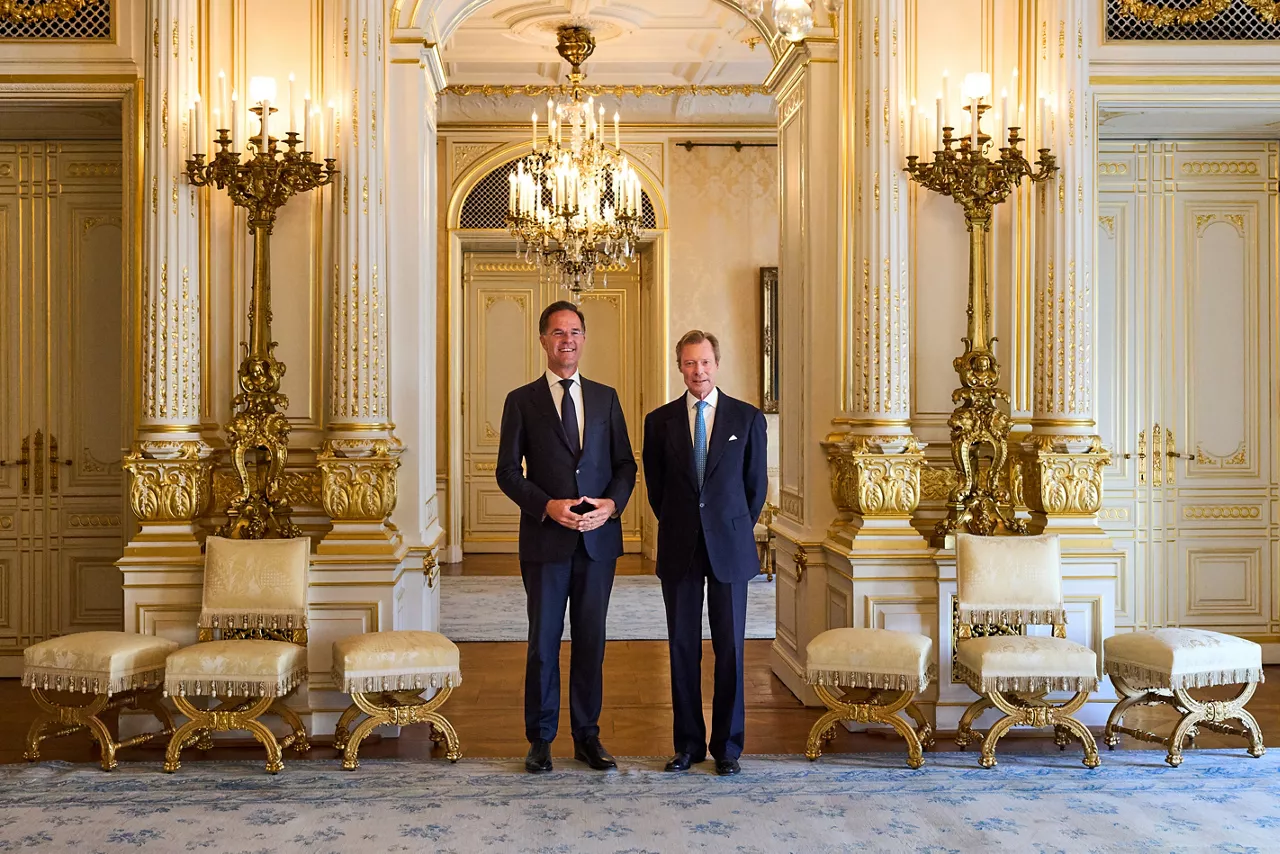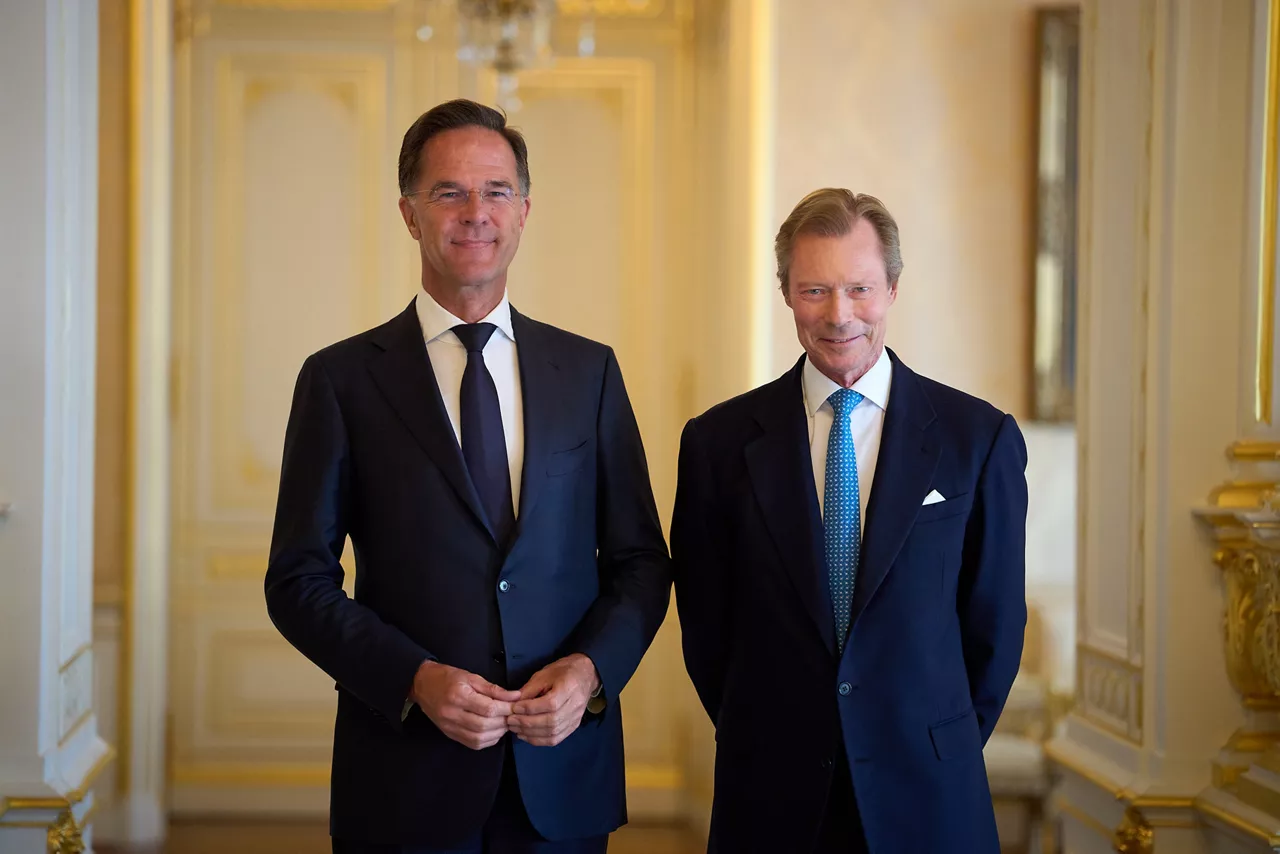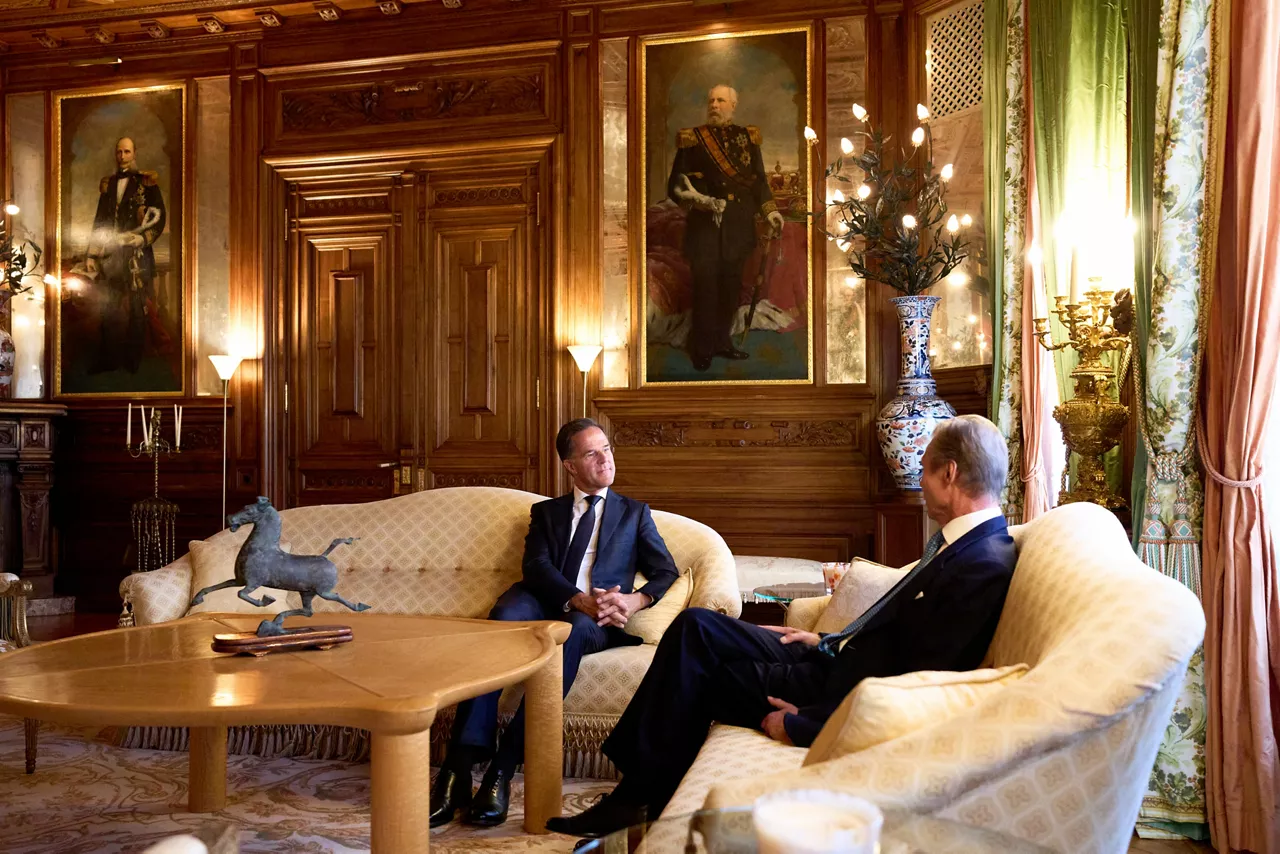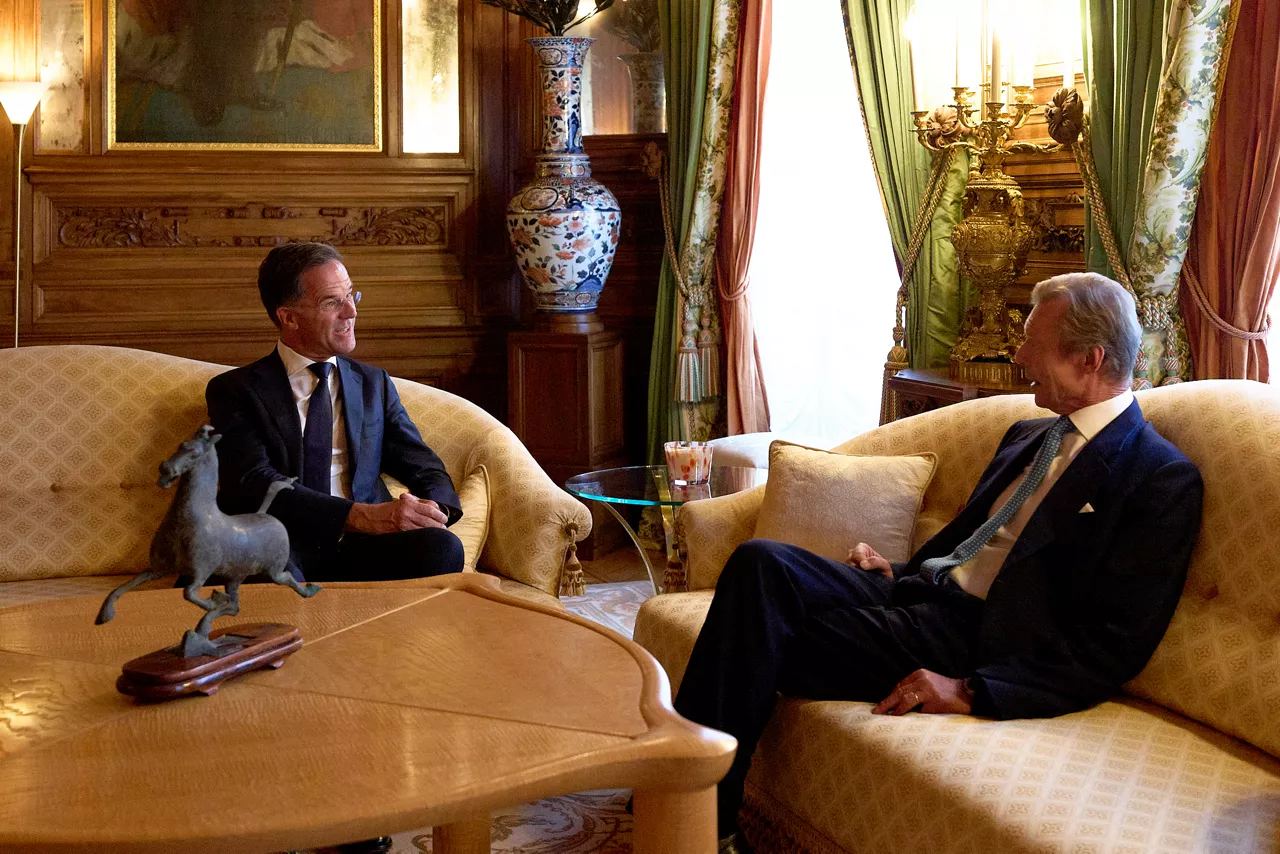Download NATO’s broadcast-quality video content free of charge

Log in
NATO MULTIMEDIA ACCOUNT
Access NATO’s broadcast-quality video content free of charge

Check your inbox and enter verification code
You have successfully created your account
From now on you can download videos from our website
Subscribe to our newsletter
If you would also like to subscribe to the newsletter and receive our latest updates, click on the button below.
Enter the email address you registered with and we will send you a code to reset your password.
Didn't receive a code? Send new Code
The password must be at least 12 characters long, no spaces, include upper/lowercase letters, numbers and symbols.
Your password has been updated
Click the button to return to the page you were on and log in with your new password.
(As delivered)
So, thank you Prime Minister, dear Luc,
and Minister of Defence Backes, dear Yuriko,
It’s always a pleasure to be in Luxembourg, indeed among friends.
You’re a founding member of NATO, founding member therefore of the Alliance.
Seventy-six years ago, that happened, and you continue to provide support to your Allies and partners.
And I just want to list a few of these items.
For example, you are a key contributor to NATO’s innovation agenda.
You play a leading role in our work when it comes to space surveillance and invest in critical satellite capabilities, as you mentioned.
And we will visit this afternoon, some of the industries to provide Allies with secure communications.
Luxembourg hosts the NATO Support and Procurement Agency, the NSPA, that agency plays a vital role in supporting the whole of the Alliance operations and procurement, including providing aid to Ukraine.
So that’s important that you host an organisation here.
You contribute to KFOR – the Alliance’s peacekeeping mission in Kosovo – and NATO’s Forward Land Forces in Romania, reinforcing our collective defence on the eastern flank and beyond.
And you also invest in major equipment and multinational capabilities, including NATO’s Multi Role Tanker Transport aircraft, the MRTT.
And this illustrates, and this is just some of what Luxembourg contributes to the NATO Alliance.
Of course, I welcome your commitment to step up defence spending. It is really important, given the strategic context we are in, we know that Russia is there as a long-term threat to the whole of the Alliance.
There is a massive build-up at this moment of the Russian Armed Forces and Russian military, and not to only organise these parades in Moscow, it’s there to be used and they use it, as we speak in Ukraine, and they might use it in other places.
So it is crucial that our deterrence is such that they will never, ever try to attack one square kilometre of NATO territory.
And then also Luxembourg’s contribution is important, as you said, you will invest 2% of gross national income in defence by the end of this year. Thank you for that, and you are ready to go much further.
And as I said, for our deterrence and our defence to remain strong, we need more capabilities and larger armed forces in the whole of NATO area.
And that is why it was also thanks to your leadership that in The Hague, we were able to come to an agreement on this famous 5% commitment, including, as you mentioned spending 3.5% of our –in your case, GNI on defence, on core defence.
This investment, by the way, will pay dividends, of course, greater security across the board, but it will also help in making sure that Ukraine stays in the fight as strong as possible.
You have already and that you also mentioned that allocated more than €250 million in military support to Ukraine since 2022.
Armoured personnel carriers, drones, anti-tank weapons and millions of rounds of ammunition.
I also welcome your contributions to NATO’s Comprehensive Assistance Package for Ukraine. As well as NSATU, this is the Command we have in Wiesbaden that coordinates everything NATO is doing for Ukraine, including the delivery for aid.
You play a vital role there.
And I think all of this underscores the vital role Luxembourg is playing when it comes to commitment to Ukraine’s sovereignty, its security, but also its post war recovery.
NATO’s steadfast support for Ukraine is only growing stronger.
You already mentioned that we are delivering essential US weapons directly to Ukraine, with funding secured from NATO Allies.
Thank you so much for the announcement to participate in that program.
It is critical to help Ukraine defend itself.
We have in a few weeks, already been able to channel two billion dollars of vital, lethal, sometimes lethal, sometimes also more defensive systems into Ukraine through this new program. It is ammunition, but also advanced air defence and much more.
And again, thank you so much for being willing to participate in what probably will be the fifth package being delivered to Ukraine.
And of course, let me use this opportunity to urge all Allies to follow Luxembourg’s lead here, to contribute to this program, but also other initiatives like investing in Ukrainian defence industry and bilaterial support many countries are delivering and the Czech ammunition initiative, but this new initiative is really key.
Finally, let me say that when it comes to Ukraine, President Trump, he has made ending this brutal war a top priority. He broke the deadlock with Putin from February onwards, sitting down in phone calls with him, but also recently, a couple of weeks ago, pledging US involvement in Ukraine, security guarantees.
As you know, we met in Washington two weeks ago with the US President and many European leaders to help him, to support him, to advance peace and security after so much suffering, but also to commend him for the fact that he is really taking leadership, a leadership role, also when it comes to ending the war in Ukraine.
For peace to last, Ukraine needs not only its own strong armed forces –that will anyway, be the first layer for Ukraine going forward after long-term ceasefire slash a peace deal, there has to be a strong Ukraine, strong Ukraine Armed Forces, strong Ukraine military and NATO is helping to build –to help them to build up that future force. But lasting peace also requires this second layer, and that is what we now call security guarantees from Ukraine’s friends and partners. The US, Europe, and others are defining them now, as you know, we are sitting together in many formats.
Also this week, there’s a lot of work going on so that when Ukraine heads into these bilateral talks or trilateral talks, they do so with unbreakable backing, and therefore ensuring that Russia will honour whatever deal is agreed and will never threaten Ukrainian territory again after a deal.
So again, thank you, Luc, Yuriko, for your leadership, for Luxembourg’s role in NATO.
It is highly valued.
It is highly appreciated.
This is important for our collective defence and also to Ukraine.
Again, thank you so much.
And for this wonderful day we will spend here, the three of us together.
Thank you.
Question:
Thank you very much, Mr Secretary General. I have a question for you that might break the ice for the very first question. How, if there ever will be a peacekeeping mission in Ukraine, how can we prevent disasters and massacres like, for example, in Srebrenica, or Sudan or Rwanda, like we've seen so many times with peacekeeping missions in the last decades?
NATO Secretary General:
The bad news is we are still at the early stage of all of this. You would love, of course, for the whole peace process to be much further. The good news is that when President Trump was elected, and I visited him in Mar-a-Lago in November, and then when he was inaugurated as Trump 47 in January. And we met again in March, and spoke a lot on the phone, that he is absolutely committed to, and he understands that for Putin to be willing to engage in talks, it's crucial that he, the President of the United States, takes that leadership role. Because at the end of the day, he is over 50% of NATO. He is 25% - the US - of world economy, by far the most powerful military, and he has that personal commitment to end the war, to end the bloodshed. Of course, this is not easy. This is not done in a couple of days. So, what we are now working on is basically on two streams. One is to somehow bring the two leaders together to start sitting down and discussing how to end the war. That's one track. And the other is to agree with the Europeans and the US on both a long-term cease fire, or preferably a full peace deal. How can we prevent the Russians from ever attacking again? And this is why we are discussing these security guarantees. Because we have to take lessons from Budapest 1994, the memorandum which has not delivered. We have to learn our lesson from [this]. And this was done with the best of intentions, the Minsk Agreements in 2014. But when it comes to preventing Russia from attacking again, it did not hold. And now we have to find a way that when we have come to an agreement with the Russians in one sort of form or whatever, that they will never, ever try again to attack Ukraine, as they will never, ever try to attack NATO. And that's why that debate is so important. Europeans are working very hard at this - NATO is involved in these talks - they are in close contact with the Americans. And the fact that President Trump, three weeks ago, said, ‘Hey, I am willing, as the US, to participate, to be involved in the security guarantees,’ of course, again, because of the might and power of that enormous country and economy and military and their value systems, was a breakthrough in itself. So to your question, it is impossible now for me to answer, because that already, and I understand your question, it is a good question, and it is basically referring to potential forms of a peace deal, etc, and then how to prevent mistakes made in the past. But it will all depend, of course, on the exact format and how we go forward. But of course, we have to take that into consideration. Thank you.
Question:
Hi, I'm Sam McNeil from the Associated Press. I wanted to ask about yesterday, the Bulgarian authorities suspect that the plane carrying Ursula von der Leyen, the European Commission President, was jammed by Russians. And we've seen jamming happen all up and down the eastern flank of the EU from Sweden down into Bulgaria, including the Defence Minister of the United Kingdom earlier this year, near Kaliningrad. Why isn't GPS jamming taken more seriously?
NATO Secretary General:
It is taken very seriously. And thank you for the question. And this is exactly why NATO is stepping up when it comes to hybrid, cyber, etc. And we have agreed on policies there to really be more effective in this area. I always hated the word ‘hybrid’ because it sounds so cuddly, but hybrid is exactly this: jamming commercial airplanes with potentially disastrous effects, an assassination attempt on a big industrialist in one of NATO Allied countries, attacking the National Health Service in the United Kingdom. So, these are not cuddly small incidents. These are huge incidents which have a huge impact. And that is also why when we found out about the cutting of the undersea sea cable between Estonia and Finland on the 25th of December last year, that the Supreme Allied Commander launched his enhanced vigilance activity in the Baltic Sea, Baltic Sentry, within 10 days. So, I'm not saying that we have completely cracked this and solved this all together. But to your question, I can assure you that we are working day and night to counter this, to prevent it, and to make sure that they will not do it again.
Question:
Hello, Joseph Gaulier from L’essentiel in Luxembourg, Mr. Rutte, many countries like Luxembourg have enhanced their defence expenditure, but currently, the US policy is changing, sometimes difficult to follow. And how do you ensure that all NATO country aim at the same goal, go to the same direction? Thank you.
NATO Secretary General, Mark Rutte:
Well, here I would not be worried about the United States. They are completely committed to NATO, they are completely committed to the NATO plans and to what they need to contribute to the overall deterrence of the Alliance. There was one big problem, and that was that whilst they were committed to NATO, there was also an expectation for us, and us being Canada and the Europeans, to at least spend what they’re spending, which I think is only fair. And we have solved that in The Hague by saying we will, we will work on this trajectory to make sure that we equalise our spending with what the US is spending. And I think again, to keep the Alliance strong, it is crucial that not one partner is spending so much more than the others. But we are not only doing this for this audience of one we are doing this because - and this is to what the Prime Minister was saying - the threat from the Russians is increasing every day. Let's not be naive about it. This might also involve one day Luxembourg, my country, the Netherlands, we are all safe now, we think we are far away from Russia, but we are very close by and the latest Russian missile technology, for example, the difference now between Lithuania on the front line and Luxembourg, The Hague or Madrid, is five to 10 minutes - that's the time it takes this missile to reach these parts of Europe. So we are all under direct threat from the Russians. We are all on the eastern flank now, whether you live in London or in Tallinn, it doesn't, there is no difference anymore. And the Americans are absolutely committed, because they understand, and they also re-engaged again with the whole of NATO, and also reconfirmed the long-term Russian threat to the whole of the Alliance, to the whole of the Euro-Atlantic. And they know deeply, and from all my conversations in Washington I sense this, that for a secure United States you need a secure Atlantic, you need a secure Europe, and you need a secure Arctic, because otherwise the US is at threat itself, even the US mainland. And of course, they also have the challenges from the Indo Pacific, so they are totally anchored in NATO. And since the NATO Summit and the commitment on the 5% defence spending, including the 3.5% on core defence, that commitment is absolutely, every sense, reconfirmed.

